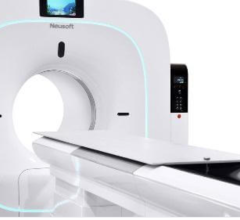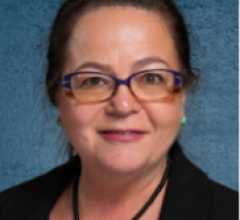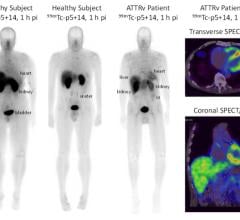
The Trilogy accelerator at the Winship Cancer Center, Emory University.
Emory University radiation oncologists recently launched a program for treating brain tumors with frameless radiosurgery using the Trilogy medical linear accelerator and other image-guidance tools from Varian Medical Systems. This state-of-the-art treatment enables physicians to accurately position and monitor patients during radiation treatment using both optical guidance cameras and cone-beam CT, which obviates the need for a standard rigid headframe.
Ian R. Crocker, M.D., FACR, professor of Radiation Oncology at Emory University School of Medicine, and his staff recently treated a 60-year-old woman who presented with two brain metastases following treatment for nonsmall-cell lung cancer. In March 2006, after successful chemotherapy and surgery for the lung primary, the woman noticed a slight drooping of the left side of her face. An MRI revealed an 11-mm right frontal mass consistent with a metastasis. She underwent conventional stereotactic radiosurgery for this lesion on May 25, 2006.
“She described the stereotactic headframe experience as excruciating and something she would never do again,” Dr. Crocker said. “During her first follow-up visit on the 6th of July, we saw a decrease in the treated lesion, but unfortunately there was a new metastasis in the right cerebellum. In consultation with the patient, we decided to treat her with frameless radiosurgery — our first ever. We planned her treatment on Aug. 1 and she was treated on Aug. 4. She was thrilled with the new procedure,” he added.
Preparation for treatment involved creation of a dental mold and a process of making sure it could be placed on the patient in a precisely reproducible way. “She passed that test with flying colors, with a maximum deviation of less than a millimeter,” Dr. Crocker said. “We then made a mask to immobilize her with the dental mold in place. Following this, she had a CT scan of the head, and later that day, a planning MRI scan of the brain.”
Timothy Fox, Ph.D., chief medical physicist at Emory, used Varian’s Eclipse treatment planning system to produce a treatment plan that would deliver Dr. Crocker’s prescription of 21 Gy at the 80 percent isodose line, using 12 static conformal beams.
On the day of treatment, the Emory team used Varian’s FramelessArray optical guidance system to position the patient for treatment. This device uses an optical camera to analyze the patient’s position by continuously monitoring a set of reflective markers attached to the bite plate. This technology also monitors the patient for any movement during treatment. If a patient does move, the treatment stops until the patient can be placed back into the correct position.
After the patient was positioned for treatment, a cone-beam CT scan was acquired using the On-Board Imager kV imaging device that is mounted on the Trilogy accelerator, and this image was compared to the earlier CT scan that had been used to plan the treatment. “We used both the auto-matching and the manual matching functions of the On-Board Imager to make the comparisons,” Dr. Crocker said. “The matches were perfect and we proceeded with treatment without any further repositioning.”
It took the Emory team less than an hour to position the patient and complete her treatment. Dr. Crocker commented, “We are in the process of implementing dynamic conformal arc techniques and when that is commissioned, the treatment times will be even shorter.”
At her first follow-up visit on Sept. 13, the patient’s tumors were shrinking and she had no new tumors.
“The frameless radiosurgery system represents the latest and best technology available and provides a new method of delivering safe and precise radiation doses with little to no discomfort for patients,” Dr. Crocker said. “Because the process does not require conscious sedation or application of a stereotactic headframe, it should yield some cost savings for the patient and the insurance companies, as well.”
Dr. Crocker summed up: “We’re excited about being able to offer this new treatment at Winship. Emerging technologies like frameless radiosurgery are transforming the future in our ability to provide advanced, compassionate care to our patients.”
Emory University School of Medicine is ranked among the nation's finest institutions for biomedical education. Its three-part mission encompasses teaching, scholarship and service. Emory's School of Medicine is an integral component of one of the nation's leading health systems, Emory Healthcare, and is affiliated with the world-renowned Emory University Hospital, located in Atlanta, GA. Since 1915, Emory University has been at the forefront of medical knowledge and research, pioneering many of the procedures that have changed the face of medical history.





 July 30, 2024
July 30, 2024 








